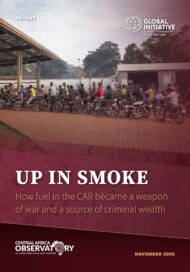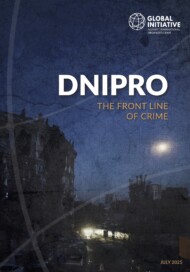Event Details
Posted on 06 Oct 2015
On 1-2 October 2015, a group of technology-sector professionals convened the Techfugees conference in London, dedicated to searching for ways in which the tech sector can help solve the crisis of migration to Europe.
The Global Initiative was amongst one of the opening keynote addresses given by experts and frontline responders outlining the underlying drivers and most compelling concerns of the way this crisis has evolved. While many of the presentations focused on meeting the needs of migrants along the route, the Global Initiative put forward that it is not possible to mount an effective response to the migration crisis without targeting smugglers as well as the migrants themselves. Smugglers may not have started this crisis, but they are amplifying it by inciting new migrants and are arguably responsible for the worst of its protection and humanitarian consequences.
The Global Initiative has compiled an extensive database of migrant-smuggling routes, including the prices that migrants pay for passage on each route, the nationality of the migrants, and the modes of transportation used in each case. The goal in collecting this information is to have a better understanding of how the smuggling networks are driving and responding to changes in policy and demand. In doing so, this information allows responses to shift towards a more predictive and proactive capacity to respond.
After a day of presentations, the conference shifted to a “hackathon” mode on the second day, in which participants broke up into groups to try to create the potential solutions and tools that had been discussed the previous day. These tech sector experts volunteered their time, pro bono, to working to develop some of the solutions proposed by the expert delegates. Some of the applications and services under development included a kit to help protect vulnerable migrants from physical and sexual abuse in camps and reception centers or a website to connect migrants with people willing to offer them housing. The Global Initiative’s database, the only tool under development focused primarily on thwarting smugglers rather than on aiding migrants, was greeted with great interest and curiosity, and work on the software necessary to visualize and publish it is well underway.
Once completed database will be published online in an interactive, visual format, available to researchers and migrants alike. The goal of publishing this database is to provide an enhanced understanding of the workings of the smuggling networks, to identify future choke points or emerging smuggling markets, and to reduce the information advantage that smugglers enjoy over migrants. Currently, migrants far too often find themselves cheated or misled by smugglers, who charge them extortionate rates for the journey. Worse, migrants who fail to bring sufficient cash for the entire journey (and who do not have family or friends with the capability to wire money to them while en route) are regularly kidnapped, forced into prostitution or slave labor, imprisoned, and/or tortured until they manage to come up with the money.
Watch the Global Initiative presentation by Adam Rodriques of the Global Initiative Secretariat. This article by Sky News, and the accompanying news report (which originally aired on Saturday 3 October) provides further information about the conference and the hackathon.
Photo credit: Boris Grdanoski, Associated Press



